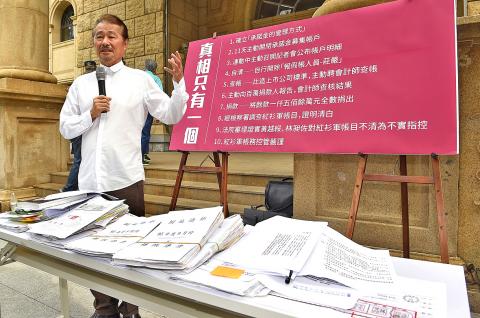Veteran political activist Shih Ming-te (施明德) yesterday rebutted allegations of financial impropriety during the 2006 anti-corruption “red shirts” against then-president Chen Shui-bian (陳水扁), as his lawsuit against former Democratic Progressive Party (DPP) Tainan City councilor Wang Ding-yu (王定宇) opened at the Taiwan High Court yesterday.
Shih, accompanied by his wife, Chen Chia-chun (陳嘉君), held a news conference in front of the court building, at which they showed stacks of receipts and accounting documents, which Shih said he planned to present as evidence.
“I have managed the public’s donations scrupulously,” Shih said.

Photo: Chen Chih-chu, Taipei Times
In response to accusations by Wang and others critics that he had profited personally from the donations, he said: “People can kill me, but they must not denigrate my integrity.”
Shih sued Wang contending that Wang made false allegations against him during an appearance on a television talk show in 2007, when Wang said: “Shih is a deplorable person. He skimmed money from donations [to the red-shirt movement].”
In the first ruling, Wang was found to have tarnished Shih’s reputation and was ordered to pay NT$1 million (US$30,520 at current exchange rates) in damages.
Wang appealed the ruling at the Supreme Court, and in June the Council of Grand Justices ruled that Wang did not have to pay damages.
However, on the basis that he had new evidence to present, Shih filed a lawsuit with the Taiwan High Court which began hearing the case yesterday.
Toward the latter phase of the red-shirt movement, quarrels over accounting and use of money became a divisive issue, as Shih and other high-ranking activists came under pressure to reveal the details of the movement’s finances, since Shih had called for the public to donate NT$100 per person to show their support.
The red-shirt leaders announced on Oct. 13, 2006, that the donations they had received came to NT$111 million, of which NT$41.78 million was spent, leaving NT$62.62 million remaining.
Wang’s lawyer Chang Ching-kai (張清凱) yesterday said the court should not have granted Shih’s request for a retrial, since the Supreme Court had already made the final ruling on the case, and that during the lower-court trial, Shih had said that most of the receipts and accounting items had already been discarded or destroyed.

Chinese Nationalist Party (KMT) Chairman Eric Chu (朱立倫), spokeswoman Yang Chih-yu (楊智伃) and Legislator Hsieh Lung-chieh (謝龍介) would be summoned by police for questioning for leading an illegal assembly on Thursday evening last week, Minister of the Interior Liu Shyh-fang (劉世芳) said today. The three KMT officials led an assembly outside the Taipei City Prosecutors’ Office, a restricted area where public assembly is not allowed, protesting the questioning of several KMT staff and searches of KMT headquarters and offices in a recall petition forgery case. Chu, Yang and Hsieh are all suspected of contravening the Assembly and Parade Act (集會遊行法) by holding

PRAISE: Japanese visitor Takashi Kubota said the Taiwanese temple architecture images showcased in the AI Art Gallery were the most impressive displays he saw Taiwan does not have an official pavilion at the World Expo in Osaka, Japan, because of its diplomatic predicament, but the government-backed Tech World pavilion is drawing interest with its unique recreations of works by Taiwanese artists. The pavilion features an artificial intelligence (AI)-based art gallery showcasing works of famous Taiwanese artists from the Japanese colonial period using innovative technologies. Among its main simulated displays are Eastern gouache paintings by Chen Chin (陳進), Lin Yu-shan (林玉山) and Kuo Hsueh-hu (郭雪湖), who were the three young Taiwanese painters selected for the East Asian Painting exhibition in 1927. Gouache is a water-based

Taiwan would welcome the return of Honduras as a diplomatic ally if its next president decides to make such a move, Minister of Foreign Affairs Lin Chia-lung (林佳龍) said yesterday. “Of course, we would welcome Honduras if they want to restore diplomatic ties with Taiwan after their elections,” Lin said at a meeting of the legislature’s Foreign Affairs and National Defense Committee, when asked to comment on statements made by two of the three Honduran presidential candidates during the presidential campaign in the Central American country. Taiwan is paying close attention to the region as a whole in the wake of a

OFF-TARGET: More than 30,000 participants were expected to take part in the Games next month, but only 6,550 foreign and 19,400 Taiwanese athletes have registered Taipei city councilors yesterday blasted the organizers of next month’s World Masters Games over sudden timetable and venue changes, which they said have caused thousands of participants to back out of the international sporting event, among other organizational issues. They also cited visa delays and political interference by China as reasons many foreign athletes are requesting refunds for the event, to be held from May 17 to 30. Jointly organized by the Taipei and New Taipei City governments, the games have been rocked by numerous controversies since preparations began in 2020. Taipei City Councilor Lin Yen-feng (林延鳳) said yesterday that new measures by